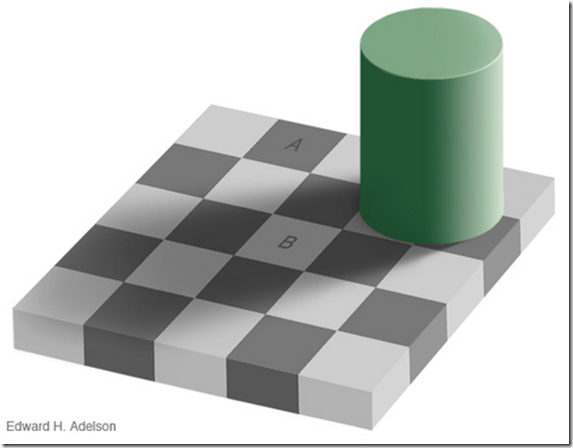Perception & Reality, The magic in breaking illusions
August 22, 2012 Leave a comment
“disillusion”, -to destroy the ideals, illusions, or false ideas of,
In truth I don’t really remember how it all started… So forgive me for my lack of precision. But looking back through my personal notes & journals I can see the thought started developing mainly through my work related activities.
I just started noticing how (mail exchange being a rather good repository for this) , here and then, sometimes in a very subtle way, some efforts just seemed to go particularly wrong or not causing the desired outcome… not due lacking knowledge or know how (I’ve been privileged to work with some of the most amazing minds I know) , or unpredictable events, or lack of action… but only because someone (including me), somewhere, had mistaken completely what the actual starting point was, or even where were we supposed to get.
Apparently, simple misperceptions in the way how we (humans) perceive or read the world around us, seemed to have a very reasonable negative effect in our effectiveness in achieving any desired outcome. Go figure! :)
When people see things as they are not, no matter how strong, how capable, how smart, how effective, how amazing they are… they will probably have a real hard time getting where they want to be. Particularly if they don’t start to “seeing it as it is” as soon as possible.
In fact it can get hard to believe that what we “see” is not actually what “it is”. Probably that’s because, regarding our physical surroundings, our senses do a rather good job of showing us a very close picture of what reality around us really is. Yes, a very close picture. But even then, it’s not reality itself. Don’t believe me? Let me share one of my favorite visual illusions by Edward H. Adelson:
Can you count how many white checks visible are in this picture?
Ok, good, that shows that…. you can count checks :) (I hope), but did you actually noticed that the A and B checks are exactly the same color?
Or may be you didn’t know that the human eye has a physiological blind spot. Actually surprisingly noticeable… How can it be that we don’t notice it, even with one eye closed? Well, our brain “magically” fills the blind spot guessing what may be there. Test it and you’ll see (or stop seeing…).
Or may be you already know about this one.
Magicians and illusionists have been exploring these kind of human ”features” extensively for centuries, creating the most fun, amazing and unbelievable illusions.
How does this relate to achieving goals, getting results, happiness, productivity, fulfillment? Well…. It does not, sorry about that. At least not directly, but I find it to be a rather good analogy (and it is fun! :) ).
Fact is, our senses do a really amazing job at perceiving reality. At least perceiving the part of reality that can usually affect us immediately. Btw, we do not see infrared, is that because they are invisible? or because they are invisible to us? (completely different story)
Our senses show us our physical surroundings reality almost perfectly. The problem is that, these days, we are forced to act upon, decide, choose, perceive and evaluate much more than our immediate physical surroundings. We have to picture what’s happening in our projects, business processes in remote locations, feelings deep inside other people, our loved ones, our friends, our colleagues, even deep within ourselves. Our senses didn’t catch up with this reality yet. They can’t help us in the same way.
We have come to blindly trust our minds for that. The problem is that our mind can frequently morph itself into the most effective “magician”, unfortunately sometimes working against our best efforts. Deluding us, silently. Showing us a “reality” that does not exist. Filling the blind spots in ways that we usually don’t even notice.
How does that relate to getting results? Well, perception, not reality itself, dictates our actions. That’s why some would state that perception=reality.
But reality always speaks last. Reality couldn’t care less with our perceptions, flawed or otherwise. Reality has the final word on the results we achieve with our efforts. The one place I know of where reality does not dictate our results is in the “Matrix”. :)
What started has a professional, productivity improvement possibility, quickly became much more than that. And today I would risk to say that this focus to consciously master our perception, our biases,our ego and getting closer to reality can be of great value in most areas of human life.
What does that mean? First of all it means that we learn to know about our brain works, how our feelings can affect your perceptions, how our mind can fool us in very predictable ways. We learn the significance of getting closer to reality, being it external or internal reality, in order to be more effective pursuing our goals and dreams.
We learn about all sort of marketing tricks. We learn about cognitive dissonance, the halo effect, the Hawthorne effect, confirmation bias, anchoring effects, inattentional blindness, the Dunning-Kruger Effect and many others. We learn to better know ourselves and others, to know what we don’t know, what we think we know. We learn to better differentiate perception, reality, facts and assumptions. We learn to live in a world of almost absolute uncertainty and use that in lots of unusual and interesting ways.
We learn that it doesn’t usually matter how often we are “seeing it wrong” but how quickly we can “see it right”.
Ironically, magic can happen both ways, there is also magic in breaking so many of our own delusions and finally being able to see reality as it really is.
This is the way I see it anyway…
Take care,
Rui









![Leadership and Self-Deception: Getting out of the Box [Kindle Edition] Leadership and Self-Deception: Getting out of the Box [Kindle Edition]](http://ws-na.amazon-adsystem.com/widgets/q?_encoding=UTF8&ASIN=B0035ZDP0Y&Format=_SL110_&ID=AsinImage&MarketPlace=US&ServiceVersion=20070822&WS=1&tag=seeit-20)

